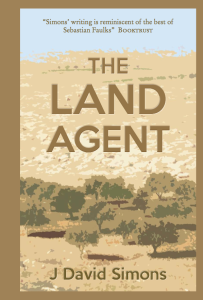Several months ago I wrote a post about J. David Simons highly-acclaimed books, The Credit Draper and The Liberation of Celia Khan – describing the lives of Jewish immigrants to Scotland at the turn of last century. Back then, I mentioned they were the first two books of a trilogy, the last of which – The Land Agent – was due out in October.
 Little did I realise that by writing the blog, I’d find myself a few months later, the proud recipient of an advance copy of The Land Agent, forwarded to me by the author “solely for the purpose of providing an online review of the book to coincide with its launch on 22nd October 2014.” (Even my request to share it with Significant Other was politely declined).
Little did I realise that by writing the blog, I’d find myself a few months later, the proud recipient of an advance copy of The Land Agent, forwarded to me by the author “solely for the purpose of providing an online review of the book to coincide with its launch on 22nd October 2014.” (Even my request to share it with Significant Other was politely declined).
I’m apparently “under no obligation to provide a positive review.” 🙂
David emailed me a pdf file – the e-book version being in the throes of preparation. What he didn’t know is that my stone-age Kindle offers two possibilities for pdfs; either they’re displayed microscopically small, or I can view only half a line at a time.
Feeling hugely privileged at having been chosen for the job, I wasn’t about to let a mere technical incumbrance stand in my way. Firing up my PC, I converted the pdf to Kindle format… all except the Ls that is – which eft an empty space wherever they were supposed to appear throughout the entire vo ume.
So ast Sunday, I sat down, ca ed up page one, and began to read.
The Land Agent begins a few years after Celia’s Liberation leaves off. It’s the 1920s, and some of our Glasgow group have moved to Palestine where they’re now tending a remote patch of parched ground, exhausted, filthy, dehydrated and bickering – while labouring to tame the barren and unforgiving soil in their new home.
and some of our Glasgow group have moved to Palestine where they’re now tending a remote patch of parched ground, exhausted, filthy, dehydrated and bickering – while labouring to tame the barren and unforgiving soil in their new home.
It’s a few chapters in that we meet the Glasgow folk, the first 40-odd pages dedicated to the early life of Polish-born Lev Gottleib, himself a reluctant immigrant who blindly followed his childhood sweetheart to the Promised Land. Through typing skills acquired in his youth, Lev becomes a Land Agent – a powder-keg occupation even in pre-Israel Palestine.
Writing objectively about land (and water) rights in Palestine is one of the most charged and difficult subjects to tackle. Back then, ownership of land was governed by an incomprehensible combination of Ottoman, French, and British Mandate law, as well as Arab and Bedouin custom and tradition. Today, some 100 years after Simons’ story takes place, the neighbourhood still remains embroiled in intractable dispute.
So, how then does Simons tell his story without alienating half his readers by taking sides? He does it by describing the way land allocations were created in the first place. Through imaginative narrative, he shows how each side manoeuvred against the other, each with their own cultural understanding of ownership. In the middle are duplicitous British imperialist authorities who stir the pot to favour their own interests, giving not a hoot for the long-term damage caused to the local populations.
All in all, The Land Agent is a great read, standing by itself even for those who haven’t read the first two volumes. However, I’d recommend reading all three books in order, adding understanding to the characters and their interaction.
During my 27 years in Israel, I’ve met many State Founders – people who arrived in the country around its establishment in 1948. Their pioneering stories of the hardship of the times remain the subject of museums up and down the country. But these times, however hard, were not as difficult as the lives of those that came in the 1920s when access to roads, water, transport, medicine, and even basic food were almost non-existent. Simons manages to capture the atmosphere, depicting people worn out by the harshness of their existence. Between scorching heat, disease, and water-scarcity, these people’s lives were a constant battle for survival. Earthquakes and murderous night-time marauders added to their grief. Many stayed, not because they wanted to, but, as persecuted Jews, they simply had nowhere else to go.
Well researched and presented, The Land Agent is nicely written. I’m no literary expert, but I feel Mr. Simons has become a more relaxed writer since the publication of The Credit Draper in 2008. He seems less anxious to impress, more comfortable just telling his story. He certainly does it well and I’d recommend all three books – especially to anyone with a Scottish/Glasgow, Jewish, or Israeli heritage. If, like me, you have all three, this trilogy is a must-read. (Much of it even takes place in Haifa where I live, creating a spooky shadow of my own identity.)
The work however, leaves me a little confused. The author describes it as fiction, yet in the epilogue to The Land Agent he recounts the ultimate fate of many of the characters. Is this epilogue also a work of fiction – or can I actually find Celia Khan’s memoirs in the Scottish Jewish Archive Centre in Glasgow?
By the time you read this, I’ll know the answer, but I’m going to leave it to you to find out for yourself.
My first two books cost me just $4 each to download to my Kindle. I see The Land Agent e-version is available (at least in my part of the world) for $7.89. It’s a good investment that guarantees a few lazy afternoons of well written, exciting, and thought-provoking reading.
Simons is a great story teller. He deserves to be read, and you deserve to hear what he has to say.

Thanks for this Mike –
I somehow missed that he’d written the other two books; just finished reading ‘the liberation’ – on with the land agent. Thanks again for bringing this to my attention. Hope all is well with you.
Keep Blogging!
Rod